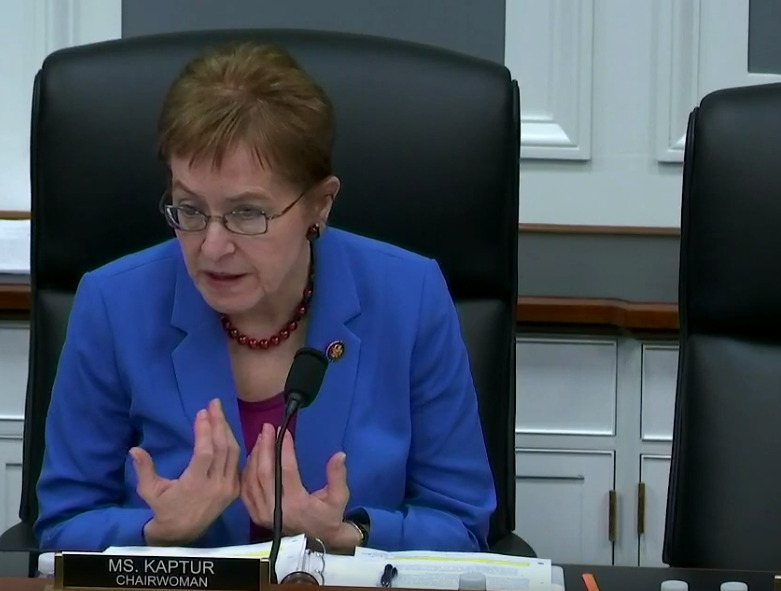
A House Appropriations panel this week followed through with its promise not to grant a $20-billion budget request for civilian nuclear weapons programs, approving instead $18 billion for fiscal 2021 as part of a spending bill that would also forbid preparation for a nuclear yield-test, limit Pentagon influence on Department of Energy budgets, and potentially slow development of a proposed new nuclear warhead.
For active nuclear weapons programs managed by DOE’s National Nuclear Security Administration (NNSA), the House Appropriations energy and water subcommittee proposed a budget some $1.3 billion above the 2020 appropriation of $16.7 billion, but well short of what the semiautonomous weapons agency sought.
Under the bill, the NNSA’s main account, Weapons Activities, would get some $13.7 billion: about $2 billion below the request, but more than $1 billion higher than the 2020 appropriation for the weapons- and infrastructure-modernization account. Defense Nuclear Nonproliferation, the account that funds programs to keep fissile materials out of the hands of bad actors, would get almost $2.3 billion: $210 million above the request, and a roughly $75 million raise over 2020. Naval Reactors, which funds research, development, and manufacturing of the reactors and fuel that power Navy warships and submarines, would get a little less than the requested $1.7 billion. The subcommittee’s bill would transfer $91 million for the Advanced Test Reactor out of NNSA Naval Reactors and into DOE’s Office of Nuclear Energy.
The subcommittee approved those spending levels Tuesday as part of a $49.6 billion Energy and Water Development bill slated for markup by the full committee on on Monday. No subcommittee member proposed any amendment to the legislation.
Full committee markups are usually longer and more contentious, filled with debate on proposed amendments.
The Senate Appropriations Committee at deadline had not released any draft 2021 budget language for the Energy Department or NNSA.
The House subcommittee’s vote came about a week after the House Armed Services Committee authorized its colleagues on the Appropriations Committee to give the NNSA all the money it wants for 2021. Authorization bills set spending limits and policy, but appropriations bills actually provide the money.
In the subcommittee spending markup this week, Republican appropriators in the House expressed apparent displeasure about the proposed $18-billion NNSA appropriation.
Rep. Mike Simpson (R-Idaho), ranking member of the energy and water subcommittee, said the measure “shortchanges” the agency’s nuclear-weapon mission, even though it would boost funding well above the 2020 appropriation and well above the the NNSA predicted last year that it would need in 2021.
Rep. Kay Granger (R-Texas), ranking member of the full Appropriations Committee, pointed out that the majority-authored bill was “well below the budget request,” and said that “[w]e must assure our ability to deter nuclear attack remains reliable and effective.”
Lawmakers traditionally frown on using appropriations bills for policy statements, but both parties often flex the power of the purse during the budget process to ensure agencies spend as congressional majorities prefer.
For example, this week’s draft bill from the House panel would forbid the Energy Department from spending 2021 funds to work with the joint DOD-DOE “Nuclear Weapons Council to guide, advise, assist, develop, or execute a budget for the National Nuclear Security Administration.” It would also forbid using the 2021 budget to prepare for a yield-bearing nuclear weapon test. Both the House and Senate Armed Services committees this year approved the NNSA do the latter, and the Senate panel approved spending $10 million on the former.
The subcommittee bill also could also attach some strings to early development of the next-generation W93 warhead. The weapon, authorized by the 2021 National Defense Authorization Acts passed by House and Senate Armed Services committees, would pair a previously tested nuclear-explosive design with a new aeroshell to create, in the decades to come, a replacement for both the current W76 and W88 warheads used today aboard U.S. ballistic-missile submarines.
Under the House panel’s draft spending bill, the text of which does not mention W93 by name, the secretary of energy could only spend 2021 appropriations on new nuclear-weapon designs, or modifications, by first providing Congress with “a preliminary cost range” for the program, plus a “detailed justification and information about the assumptions underlying such an action.” The prohibition would even apply to studies about new designs or modifications, according to the bill.
Nuclear explosive testing in particular has been a contentious issue, particularly for House Democrats, since The Washington Post reported in May that the Trump administration had discussed resuming these long-moribund tests, in part as a tactic to encourage Russia and China to negotiate a trilateral nuclear arms control agreement.
The chairs of the House Armed Services and House Appropriations committees quickly wrote a letter to Secretary of Energy Dan Brouillette and Secretary of Defense Mark Esper demanding answers about whether those agencies planned to resume nuclear-explosive tests. The administration apparently answered those letters in June, a spokesperson for the Armed Services Committee said this week, but the reply hasn’t been made public.